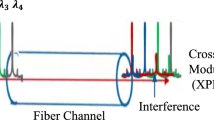Abstract
This paper offers to analyze the performance and mitigation strategy for multi-user interference (MUI) based line-of-sight (LOS) infrared (IR) communication system in free space optics (FSO). The model is predicated upon the modulation scheme of code shift keying (CSK) in comparison with the conventional on off keying technique (OOK) for the outdoor environment. To interpret the analytical study, in addition to CSK, 20 μm is guaranteed as an operating wavelength for far infrared (FIR) communication purpose. With a power allocation of 1–10 mW, a maximum data rate of greater than \(10^6\) bps is achieved and the results are obtained in 1000 m distance. The results indicate that the device output is very responsive to the channel model preference. During the case of atmospheric instability, the comparatively unused FIR spectrum has been found to be ideal for external optical communications. The outcomes are illustrated with the consequences on the system due to intrusions and disruption with the FSO waveforms with increasing numbers of users and the performances of signal to noise ratio as well as bit error rate are improved in the turbulence FSO environment.











Similar content being viewed by others
References
Abdulameer, L.F., Jignesh, J.D., Sripati, U., Kulkarni, M.: BER performance enhancement for secure wireless optical communication systems based on chaotic MIMO techniques. Nonlinear Dyn. 75(1), 7–16 (2014)
Alexander P.D., Rasmussen L.K., et al.: On the windowed Cholesky factorization of the time-varying asynchronous CDMA channel. IEEE Trans. Commun. 46(6), 735–737 (1998)
Alexander, P.D., Reed, M.C., Asenstorfer, J.A., Schlegel, C.B.: Iterative multiuser interference reduction: Turbo CDMA. IEEE Trans. Commun. 47(7), 1008–1014 (1999)
Assosiation, Telecommunication Industry: mobile station-base station compatibility standard for dual-mode wideband spread spectrum cellular system. In: TIA/EIA/IS-95 (1993)
Cavallari, R., Martelli, F., Rosini, R., Buratti, C., Verdone, R.: M-ary spreading-code-phase-shift-keying modulation for DSSS multiple access systems. IEEE Trans. Commun. 57(11), 3220–3224 (2009)
Chen, Y., Wang, D., Chen, S., Ma, W., Li, D., Dong, Q.: Research on receiving method of Code Shift Keying (CSK) signal. In: China Satellite Navigation Conference, Springer, Singapore, pp. 298–309 (2020)
Denic, S.Z., Djordjevic, I., Anguita, J., Bane, V., Neifeld, M.A.: Information theoretic limits for free-space optical channels with and without memory. J. Lightwave Technol. 26(19), 3376–3384 (2008)
Dillard, G.M., Reuter, M., Zeiddler, J., Zeidler, B.: Cyclic code shift keying: a low probability of intercept communication technique. IEEE Trans. Aerosp. Electron. Syst. 39(3), 786–798 (2003)
Duel-Hallen, A.: A family of multiuser decision-feedback detectors for asynchronous code-division multiple-access channels. IEEE Trans. Commun. 43(2/3/4), 421–434 (1995)
Ghassemlooy, Z., Popoola, W.O., Erich, L.: Free-space optical communication using subearrier modulation in gamma–gamma atmospheric turbulence. In: 9th International Conference on Transparent Optical Networks, ICTON’07, vol. 3, pp. 156–160 (2007)
Kaddoum, G., Chargé, P., Roviras, D.: A generalized methodology for bit-error-rate prediction in correlation-based communication schemes using chaos. IEEE Commun. Lett. 13(8), 567–569 (2009a)
Kaddoum, G., Chargé, P., Roviras, D., Fournier-Prunaret, D.: A methodology for bit error rate prediction in chaos-based communication systems. Circuits Syst. Signal Process. 28(6), 925–944 (2009b)
Lupas, R., Verdu, S.: Linear multiuser detectors for synchronous code-division multiple-access channels. IEEE Trans. Inf. Theory 35(1), 123–136 (1989)
Mahadevappa R.H., Proakis J.G.: Mitigating multiple access interference and intersymbol interference in uncoded CDMA systems with chip-level interleaving. IEEE Trans. Wirel. Commun. 1(4), 781–792 (2002)
Tam, W.M., Lau, F.C.M., Tse, C.K., Lawrance, A.J.: Exact analytical bit error rates for multiple access chaos-based communication systems. IEEE Trans. Circuits Syst. II Express Briefs 51(9), 473–481 (2004)
Wang, N., Cheng, J.: Moment-based estimation for the shape parameters of the Gamma–Gamma atmospheric turbulence model. Opt. Express 18(12), 12824–12831 (2009)
Wang, X., Poor, H.V.: Iterative (turbo) soft interference cancellation and decoding for coded CDMA. IEEE Trans. Commun. 47(7), 1046–1061 (1999)
Wong, A.Y.-C., Leung Victor, C.M.: Code-phase-shift keying: a power and bandwidth efficient spread spectrum signaling technique for wireless local area network applications. Electr. Comput. Eng. Eng. Innov. 2(6), 478–481 (1997)
Yoshida, T., Nakagawa, M.: Spread spectrum synchronizing loop for spreading code modulated by code shift keying. Electron. Commun. Jpn. (Part I: Communications) 67(10), 82–89 (1984)
Zhang, B., Xu, W., Wu, Y., Wang, L.: Design and performance analysis of multilevel code-shifted \(M\)-Ary differential chaos shift keying system. IEEE Trans. Circuits Syst. II Express Briefs 66(7), 1257–1261 (2018)
Zhou, F., Liu, B., Nie, D., Yang, G., Zhang, W., Ma, D.: M-ary cyclic shift keying spread spectrum underwater acoustic communications based on virtual time-reversal mirror. Sensors 19(16), 3577 (2019)
Acknowledgements
This research was supported by Basic Science Research Program through the National Research Foundation of Korea (NRF) funded by the Ministry of Education (2018R1D1A1B07043286).
Author information
Authors and Affiliations
Corresponding author
Additional information
Publisher's Note
Springer Nature remains neutral with regard to jurisdictional claims in published maps and institutional affiliations.
Rights and permissions
About this article
Cite this article
Behera, P., Siddique, A., Delwar, T.S. et al. Performance analysis of FIR based communication in multi user scenario using CSK. Opt Quant Electron 53, 486 (2021). https://doi.org/10.1007/s11082-021-03130-4
Received:
Accepted:
Published:
DOI: https://doi.org/10.1007/s11082-021-03130-4




